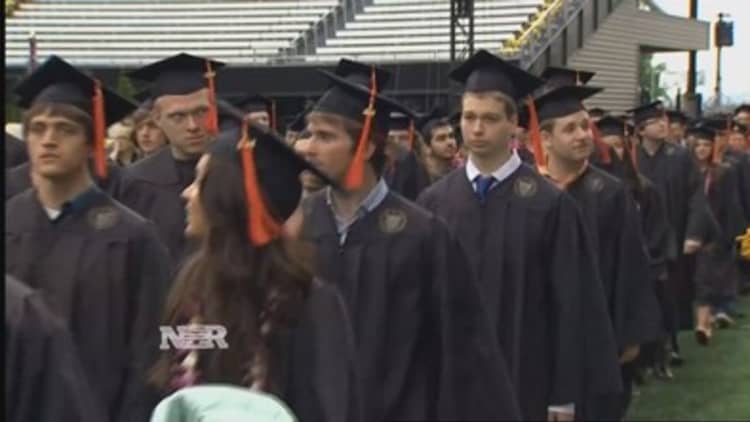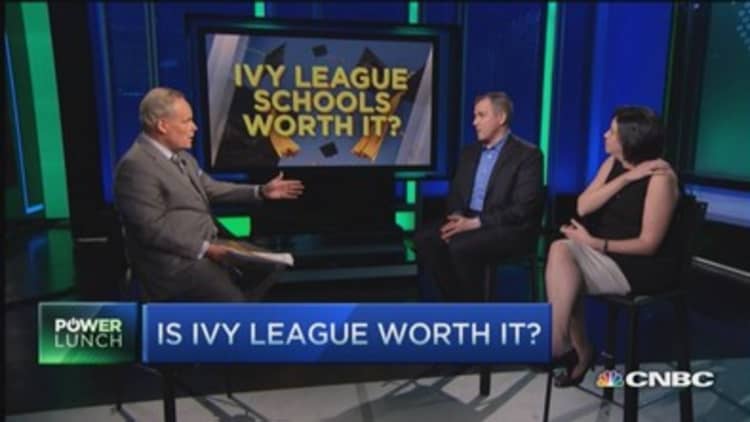


Demand for college-educated employees is on the rise, a trend that can be a mixed bag for job hunters.
From 1967 to 2007, the share of high-skill managerial and professional jobs rose from 21 percent to 35 percent of U.S. employment, according to a new report from Georgetown University's Center on Education and the Workforce. Over the same period, the report noted, the share of college-educated workers rose from 13 percent to 32 percent, and those workers are producing more than half of the country's economic output.
"For those who get a post-secondary education, and who get it in the right field, it's a very positive story," said Anthony P. Carnevale, the center's director and lead author of the report.
Read More 2015 grads may have missed the hiring wave
But there is a downside. Rising demand for college-educated workers is a driver of income inequality, he said. Over 40 years, the college wage premium (the difference between the average salaries of college and high school graduates) doubled from 40 percent to 80 percent, according to the report, while the share of low-skill jobs fell from 39 percent to 29 percent of the workforce. "The U.S. economy's largest and fastest growing sectors—business services, finance, healthcare and education—have little room for high school educated workers," notes the report.
"Access to education is pretty much the arbiter of middle-class status," said Carnevale. "It becomes the nut you have to crack."
The Georgetown University report's data stops at 2007, but the shift toward highly skilled jobs has accelerated in recent years. "When you look through the recession, these trends become even stronger," said Carnevale. Jobs requiring a high school education or less tend to disappear. "They just don't come back," he said. Jobs requiring a bachelor's degree disappear more temporarily, although they tend to come back in different industries, contributing to slow hiring.
Read MoreBig interview? Wear something expensive
The message for young adults is more nuanced than simply, "go to college," however. "If you don't pursue education or training beyond high school, you're probably in trouble," said Philip D. Gardner, director of the College Employment Research Institute at Michigan State University. "But a lot of jobs are not necessarily requiring a four-year degree. That should be very clear." The center's October hiring outlook forecast a 19 percent increase in hiring for Class of 2015 grads with an associate's degree, versus 16 percent for those with a bachelor's degree. Other jobs focus more on apprenticeships or certificate programs, he said.
"The primary financial motivation for a college degree is to get a better-paying job," said Mark Kantrowitz, senior vice president at Edvisors.com. "College is still a worthwhile investment. The key is not to take on too much debt." A 2014 report from the Federal Reserve Board of San Francisco estimated that college grads earn $830,000 more over their work lives, but there's going to be substantial variation based on your field. If the total owed at graduation is more than your starting salary, that spells financial trouble, he said.
Just having a college degree doesn't automatically make you hirable, either. The job market is still competitive enough that employers can focus on grads who have the right mix of education and skills, Gardner said. "They have to come out with what the employers are looking for," he said. "We're not back in '98, '99 when any warm body would do."
Read MoreOut of work? Take these steps right now
Grads face slim pickings on job listings. Currently, 5 percent of all job openings nationwide are targeted to college students, down from 6 percent a year ago, according to a report from online job marketplace Simply Hired. Among those listings, there's a 20 percent increase in full-time positions. But the data also turned up a 5 percent increase in office jobs that haven't traditionally required a college degree but now do, including customer service agents, receptionists and data entry workers.
Carnevale said most employers aren't asking for a college degree if one isn't strictly required.
"The fact that they've doubled the wage premium—that is, the price that they're willing to pay [for a degree-bearing candidate]—says they're awfully stupid, or they're chasing something," he said. "It's clear they're chasing skill."


